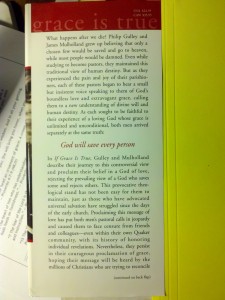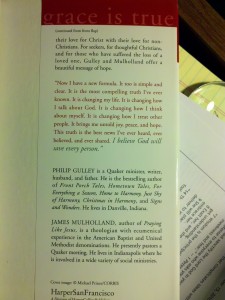If Grace Is True
From 30goodminutes.org “If Grace is True”
Twenty-two years ago I was called to pastor my first church: a small, rural Quaker meeting in the Midwest. We Quakers were musically challenged and had to draft a Baptist woman to play the organ. In addition to her musical talent, she possessed a keen radar for heresy. My second Sunday there, I said something in the sermon that caused her to be suspicious of my theology.
After meeting for worship, she approached and asked if I believed in hell. I told her no, I didn’t think so. I had dabbled in the history of religion enough to be suspicious of hell. No matter what church I attended, it was always the other people who were going there. Then she asked if I believed someone had to be a Christian to go to heaven. I told her that made no sense to me.
That afternoon, she began working the phones, calling the elders to report me, threatening to leave if I weren’t fired. Pastors are as common as starlings, while organists are a rarer breed, so her ultimatum caused much anxiety. After church, the next Sunday, the elders asked to meet with me and gave me the option of recanting or being fired. “Just say you believe in hell so we can get beyond this,” the head elder said.
I sat there wondering what I’d have to say the next time the church needed to get beyond something. Though I’d hoped to last longer than three weeks in my first pastorate, I couldn’t bring myself to affirm that woman’s vision of God and I was fired. I went out to the car where my wife was waiting.
“What happened?” she asked.
“Good news and bad news,” I told her.
“Tell me the good news first.”
“We get to sleep in next Sunday,” I said.
But word travels fast in Quaker circles and by that afternoon I’d been invited to speak at another meeting. It was a meeting with a reputation for theological rigidity and I wasn’t anxious to be their pastor. So I preached a sermon whose theme was the sentence, “If you can’t love homosexuals, you can’t love God.” I really didn’t want to work there.
Afterwards, they filed down the basement while I sat with my wife in the meeting room upstairs. I could hear them talking through the heating ducts. At one point, an elder tromped upstairs to ask me if I believed in hell. I told him no. He appeared somewhat shaken by that revelation, then hurried back downstairs to report my sacrilege to the others.
If Quakers voted, they never would have called me. But several persons pointed out that I was new to ministry and deserved an opportunity. Besides, I heard one man say through the heating duct, being new to ministry we won’t have to pay him very much. Well, that settled it. I was at that congregation four years. By the time I left, I believed in hell.
Years ago, I rejected the idea that God sends people who don’t believe the “right” things to hell. I didn’t do that with any sophistication. I couldn’t cite respected theologians or quote from the Bible. Hell just didn’t seem right. Because I was in a religious climate which discouraged questioning, I kept my convictions to myself. It took many years for me to share publicly what I believed privately: hell is killing us. The moral decline of a religion begins when it creates a hell, a place of punishment and torment where those who are different must go. As soon as religions create such places, they inevitably create the outsiders who go there, giving themselves tacit permission to do to them whatever they wish. Hell is killing us. It starts by killing our moral sensitivity. It ends, almost always, in the death of others.
I was speaking at a church this past winter. Afterwards a man approached me and said that as a progressive Christian he didn’t even believe in an afterlife. “I think the Church needs to stop talking about heaven and hell,” he said.
I wish we had that luxury. But when hell is killing us, the Church needs to talk about it.
So let’s talk.


 Code
Code
